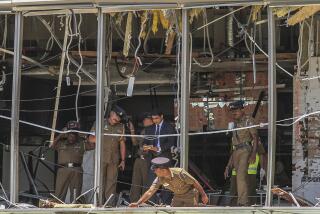Death Toll Reaches 73 in Sri Lanka Suicide Truck Bombing
- Share via
COLOMBO, Sri Lanka — Soldiers and police clawed through the soot-blackened shambles of this capital’s devastated financial district Thursday, hoping to unearth survivors of a destructive terrorist attack but finding only more dead.
Grim-faced government officials vowed that the suicide truck bombing that tore out Colombo’s commercial heart the day before will only strengthen their resolve to defeat Tamil separatists in battle while wooing members of the ethnic minority politically.
At least 73 people were killed and 1,272 injured in the blast and ensuing fires, according to police.
“This calamity underlines the paramount need to defeat the LTTE [Liberation Tigers of Tamil Eelam],” Justice Minister Gamini L. Peiris told a news conference. “Military operations will be intensified in the north and east.”
But President Chandrika Kumaratunga and her ministers also faced tough questions about how police and security officials could have allowed such a brazen attack at 11:15 a.m. on a busy business day in the country’s trade and banking center.
A high-ranking police officer seemed to blame what happened on human error or oversight. “Somebody can slip,” acting Police Inspector General Mitra Arayasinghe told reporters. “An officer at a particular point and a particular time may not have been alert.”
Arayasinghe said the truck bomb that rammed into the Central Bank building had its deadly cargo, estimated by police to be up to 440 pounds of explosives, covered with sacks of rice husks.
The vehicle apparently slipped through police checkpoints despite greatly beefed up security in Colombo over the last two months.
In the shattered three-tower ruin that had been the Central Bank, and at seven other buildings wrecked by the bomb’s mighty concussion or gutted by the blazes it kindled, men working with shovels, front-end loaders or bare hands searched Thursday for people who had been buried alive.
By nightfall, they had eased the charred and broken bodies of 13 men and women from the rubble. Two more bodies were discovered after daybreak today.
Officials held out little hope that any survivors would be found. “Alive? Maybe. But it’s very unlikely,” said Fire Officer S. A. Gunasiri.
At Colombo General Hospital, visitors anxiously searched handwritten lists of the more than 1,200 people who had been brought there Wednesday. The names of the dead were written in red ink. Seventy-five patients were listed as critical.
Small fires were still burning in the wreckage. Men toting shovels and brooms were organized to clean up the jagged shards of glass, shattered masonry and other debris littering the pavement. Kept at a distance by police and soldiers, throngs of office employees, Buddhist monks in saffron robes, youngsters and other Sri Lankans stood gaping at the scale of the damage.
The Tigers, who have been battling for an independent Tamil homeland in this Indian Ocean island nation for nearly 13 years, denied they carried out the attack. The guerrillas accuse Kumaratunga’s government of being dominated by the Buddhist Sinhalese majority and of killing and displacing Tamil civilians, who are predominantly Hindu.
Two suspects were caught after members of the public pursued them into a bakery, where they were changing clothes, Arayasinghe said. Police officials said the two men, whom they identified as Ragu Ruben and Dharma Ruben from the northern rebel-held town of Kilinochchi, were carrying automatic rifles, grenades and bomb kits.
Police said the two admitted they planned the bombing under guidance from the Tigers.
According to Arayasinghe, the bombers drove the vehicle on Tuesday down from Vavuniya, a government-controlled town in the north inhabited largely by Tamils. Police on Thursday raided a house in northern Colombo that they believe the bombers used for a hide-out and made several arrests.
During the suicide attack, at least two men jumped from the truck and fired a rocket-propelled grenade into an office building across the street from the bank, setting it ablaze, police said. They then shot at guards stationed outside the bank, according to witnesses. The truck was then steered into a crash barrier--set up in front of the bank as a security measure--and detonated.
For many Sri Lankans, the attack was another reminder that the Tiger guerrillas are both ruthless and enormously resourceful. Many Colombo residents said they are bracing for more attacks.
“Oh yes, this will go on for some time,” said H. K. Weheragoda, 51, whose wife was hurt in the bombing. “You name the type of government that is able to surmount this type of warfare.”
More to Read
Sign up for Essential California
The most important California stories and recommendations in your inbox every morning.
You may occasionally receive promotional content from the Los Angeles Times.













